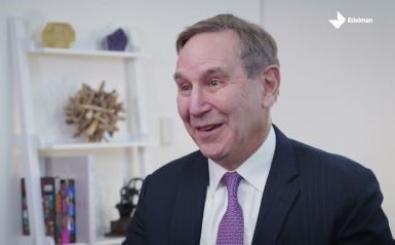In honour of this year’s International Women’s Day, we had the pleasure of interviewing several of our Brussels colleagues to better understand what diversity and inclusion mean to them, the progress they’d still like to see when it comes to gender equality, and their best advice for our future female leaders.
The power of diversity
Recognising the power of diversity is key to truly creating an innovative and creative culture at work. This is a strongly shared sentiment throughout Edelman and our interviewed colleagues often pointed to its importance. Teams thrive when comprised of people with a multitude of diverse backgrounds and experiences. As Jeremy Bossu, the Head of Corporate Communications, underlines, “people have to be confronted with the beauty of differences in a positive and frequent way in order to understand that change can be beneficial.”
The value of diversity can also be considered from a business standpoint; only a diverse set of people looking at the same issue but from different perspectives can develop truly original and innovative solutions. Amaia Betelu, the Managing Director and Acting President of EGA Brussels, points to this added advantage, saying that “our clients can benefit from multiple points of views, experiences, skills, backgrounds to get better at what we do, and who we are, by learning from each other, understanding the other side.”
Edelman is committed to encouraging an environment that is both safe and conducive for women of all backgrounds to enjoy equal opportunities to grow. Paula Garcia Almonacid, Senior Analyst, notes that ‘’it is important that big corporations, such as Edelman, lead the way implementing initiatives that empower not only women but also other sectors in society. As a multinational company, we have the right tools to start a change’’. That’s why our Global Women’s Equality Network (GWEN) is continuously at work. Founded in 2011, this internal initiative was created with the goal of achieving gender parity within our firm’s most senior levels. And while this milestone was achieved in 2020, we are still committed to consistently maintaining these levels within our network and to achieving new goals supporting our mission.
The importance of passion and drive
While progress is underway in most industries, younger women starting their careers can sometimes find the process daunting. We asked our colleagues what advice they would give to the next generation, and most stressed the importance of having passion and drive for what you do. Amaia’s advice for someone starting their career “is to choose something you really feel passionate about (otherwise it will be a nightmare) and work as hard as you can.”
To ensure women feel motivated and empowered to become company leaders, our GWEN teams have put in place mentorship and sponsorship opportunities for women at all levels to support diverse talent and help them grow in their field of expertise.
But this shouldn’t just stop at work. Inspirational female role models are everywhere. Amaia shares her admiration for her mother and the challenges she had to overcome 60 years ago running her own business: “A full-time working mum of four in the Basque Country, running her own business (for which the bank needed her father’s signature!) and promoting, as much as she could, women’s economic independence.”
And Jeremy beautifully shares how the women in his life inspire him daily: “I admire my mum for instilling fantastic values in me and for dealing with cancer without impacting the lives of those around her. My foster daughter for overcoming hardships that she does not yet comprehend. My wife for juggling several lives in one: a mother, a wife, a teacher, a neuropsychologist, a friend and a woman above all.”
How can we move forward?
While there is much to be proud of regarding advancements in gender parity and women’s empowerment, our work in gender representation is far from over. One important example is the pay gap women still experience, Amaia shares that “the ‘equal pay principle’ for example has been enshrined in the Treaties since 1957 (for ‘only’ 65 years) and still there is a 14% pay gap in the EU and this increases to 30% when it refers to pensions. Why is this still happening? Why are women paid less when doing the same work as men?”
To remedy these current inequalities, Amaia suggests “more education, more empowerment, in particular for girls and young women, and better role models. But I would also like to see more fines and sanctions as it seems that companies and countries have not complied with existing rules.”
On our end, we’ve been working to increase transparency when it comes to diversity in our workforce. Since 2018, we measure our workforce representation at all levels in the firm, as well as pay equity by race and ethnicity, in addition to gender. A deeper look into this data helps us see if and where changes need to be made.
In light of International Women’s Day, we look back at our achievements, but more importantly, we need to look at what is yet to come. We will continue to foster a truly inclusive work environment with equal opportunities for everyone. This is the foundation of a workplace where everybody can thrive!



